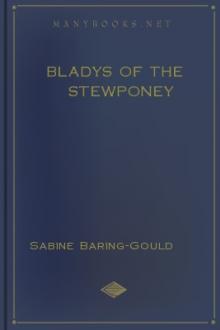The Broom-Squire - Sabine Baring-Gould (life books to read .txt) 📗

- Author: Sabine Baring-Gould
Book online «The Broom-Squire - Sabine Baring-Gould (life books to read .txt) 📗». Author Sabine Baring-Gould
Then the woman was silent, looking moodily down. The floor was strewn with flakes of whitewash as though snow had fallen over it.
"You see," said Mrs. Rocliffe, "Jonas would go to the expense of whitenin' the ceilin', just because you was comin.' It had done plenty well for father and mother, and I don't mind any time it were whitened afore, and I be some years the elder of Jonas. The ceiling was that greasy wi' smoke, that the whitewashin' as it dried 'as pealed off, and came down just about. You look up--the ceilin' is ten times worse than afore. It looks as if it were measly. I wouldn't sweep up the flakes as fell off just to let Jonas see what comes of his foolishness. I told him it would be so, but he wouldn't believe me, and now let him see for himself--there it is."
With a sort of malignant delight the woman observed Mehetabel, and saw how troubled and unhappy she was.
Again a stillness ensued. Mehetabel could hear her heart beat. She could hear no other sound. She looked through the room towards the clock. It was silent.
"Ah, now there," said Sarah Rocliffe. "There be that, to be sure. Runned down is the weight. It wasn't proper for me now to wind up the clock. As you be the new mistress in the house, it is your place and dooty. I suppose you know that."
Then from without Mehetabel heard the grunts of the sow in the stye that adjoined the house, and imparted an undesirable flavor to the atmosphere in it.
"That's the sow in the pen," said Mrs. Rocliffe; "she's wantin' her meat. She hain't been galliwantin', and marryin', and bein' given in marriage. I'm not the mistress, and I've not the dooty to provide randans and crammins for other folks' hogs. She'll be goin' back in her flesh unless fed pretty smart. You'd best do that at once, but not in your weddin' dress. You must get acquainted together, and the sooner the better. She's regular rampagous wi' hunger."
"Would you help me in with my box, Mrs. Rocliffe?" asked Mehetabel. "Jonas set it down by the door, and if I can get that upstairs I'll change my dress at once, and make the fire, clean the floor, wind up the clock, and feed the hog."
"I've such a terrible crick in my back, I dussn't do it," answered Sarah Rocliffe. "Why, how much does that there box weigh? I wonder Jonas had the face to put it in the cart, and expect Clutch to draw it. Clutch didn't like it now, did he?"
"But how can I get my box in and carried up? Jonas is with the horse, I suppose?"
"Oh, yes, he is minding the horse. Clutch must be made comfortable, and given his hay. I'll be bound you and Jonas have been eatin' and drinkin' all day, and never given Clutch a mouthful, nor washed his teeth with a pail o' water."
"I'm sure Joe Filmer looked to the horse at the Ship. He is very attentive to beasts."
"On ordinary days, and when nuthin' is goin' on, I dare say--not when there's weddin's and ducks and green peas goin' for any who axes for 'em."
The report that ducks and green peas were to form an element of the entertainment had been told everywhere before the day of the marriage, and it was bitterness to Mrs. Rocliffe to think that "on principle," as she put it, she had been debarred from eating her share.
"Ducks and green peas!" repeated she. "I s'pose you don't reckon on eating that every day here, no, nor on Sundays, no, not even at Christmas. 'Taint such as we in the Punch-Bowl as can stuff ourselves on ducks and green peas. Green peas and ducks we may grow--but we sells 'em to the quality."
After some consideration Mrs. Rocliffe relented sufficiently to say, "I don't know but what Samuel may be idlin'; he mostly is. I'll go and send my son Samuel to help you with the box."
Then with a surly "Good-night" the woman withdrew.
After a couple of minutes, she returned: "I've come back," she said, "to tell you that if old Clutch is off his meat--and I shouldn't wonder if he was--wi' neglect and wi' drawing such a weight--then you'd best set to work and make him gruel. Jonas can't afford to lose old Clutch, just becos he's got a wife." Then she departed again.
Jonas was indeed in the stable attending to the horse. He had, moreover, to run the cart under shelter. Mehetabel put out a trembling hand to snuff the candle. Her hand was so unsteady that she extinguished the light. Where to find the tinder box she knew not. She felt for a bench, and in the darkness when she had reached it, sank on it, and burst into tears.
Such was the welcome to her new home.
For some time she sat with as little light in her heart as there was without.
She felt some relief in giving way to her surcharged heart. She sobbed and knitted her fingers together, unknitted them, and wove them together again in convulsions of distress--of despair.
What expectation of happiness had she here? She was accustomed at the Ship to have everything about her neat and in good order. The mere look round that she had given to the room, the principal room of the house she had entered, showed how ramshackle it was. To some minds it is essential that there should be propriety, as essential as that the food they consume should be wholesome, the water they drink should be pure. They can no more accommodate themselves to disorder than they can to running on hands and feet like apes.
It was quite true that this house would be given up to Mehetabel to do with it what she liked. But would her husband care to have it other than it was? Would he not resent her attempts to alter everything?
And for what purpose would she strive and toil if he disapproved of her changes?
She had no confidence that in temper, in character, in mind, he and she would agree, or agree to differ. She knew that he was grasping after money, that he commended no man, but had a disparaging word for every one, and envy of all who were prosperous. She had seen in him no sign of generosity of feeling, no spark of honor. No positive evil was said of him; if he were inclined to drink he was not a drunkard; if he stirred up strife in himself he was not quarrelsome. He over-reached in a bargain, but never did anything actually dishonest. He was not credited with any lightness in his moral conduct towards any village maid. That he was frugal, keen witted, was about all the good that was said, and that could be said of him. If he had won no one's love hitherto, was it likely that there was anything lovable in him? Would he secure the affections of his wife?
Thoughts rose and fell, tossed and broke in Mehetabel's brain; her tears fell freely, and as she was alone in the house she was able to sob without restraint.
Jonas had chained up Tartar, and the dog was howling. The pig grunted impatiently. A rat raced across the floor. Cockroaches came out in the darkness and stirred, making a strange rustling like the pattering of fine rain.
Mehetabel could hear the voice of her husband in the yard. He was thrusting the cart under a roof. He would be in the house shortly, and she did not wish that he should find her in tears, that he should learn how weak, how hopeless she was.
She put her hand into her pocket for a kerchief, and drew forth one, with which she staunched the flow from her eyes, and dried her cheeks. She put her knuckle to her lips to stay their quivering. Then, when she had recovered some composure, she drew a long sigh and replaced the sodden kerchief in her pocket.
At that moment she started, sprang to her feet, searched her pocket in the darkness with tremulous alarm, with sickness at her heart.
Then, not finding what she wanted, she stooped and groped along the floor, and found nothing save the flakes of fallen whitewash.
She stood up panting, and put her hand to her heart. Then Jonas entered with a lantern, and saw her as she thus stood, one hand to her brow, thrusting back the hair, the other to her heart; he was surprised, raised his lantern to throw the light on her face, and said:--"Wot's up?"
"I have been robbed! My fifteen pounds have been taken from me."
"Well I--"
"Jonas!" she said, "I know it was you. It was you who robbed me, where those men robbed my father. Just as I got into the cart you robbed me."
He lowered the lantern.
"Look here, Matabel, mind wot I said. In matrimony it's all give and take, and if there ain't give on one side, then there's take, take on the t'other. I ain't going to have this no Paradise if I can help it."
CHAPTER XV.
IVER.
Next day was bright; but already some rime lay in the cold and marshy bottom of the Punch-Bowl.
Mehetabel went round the farm with Bideabout, and with some pride he showed her his possessions, his fields, his barn, sheds and outhouses. Amongst these was that into which she had been taken on the night of her father's murder.
She had often heard the story from Iver. She knew how that every door had been shut against her except that of the shed in which the heather and broom steels were kept that belonged to Jonas, and which served as his workshop.
With a strange sense, as though she were in the hands of Fate thrusting her on, she knew not whither, with remorseless cogency, the young wife looked into the dark shed which had received her eighteen years before.
It was wonderful that she should have begun the first chapter of her life there, and that she should return to the same spot to open the second chapter.
She felt relieved when Jonas left her to herself. Then she at once set to work on the house, in which there was much to be done. She was ambitious to get it into order and comfort before Mrs. Verstage came to visit her in her new quarters.
As she worked, her mind reverted to the Ship. Would she be missed there? Would the new maid engaged be as active and attentive as she had been? Her place in the hearts of the old couple was now occupied by Iver. However much the innkeeper might pretend to be hard of reconciliation, yet he must yearn after his own son; he must be proud of him now that Iver was grown so fine and independent, and had carved for himself a place in the world.
When the first feeling of regret over her departure was passed away, then all their thoughts, their aspirations, their pride would be engrossed by Iver.
Mehetabel was scouring a saucepan. She lowered it, and her hands





Comments (0)